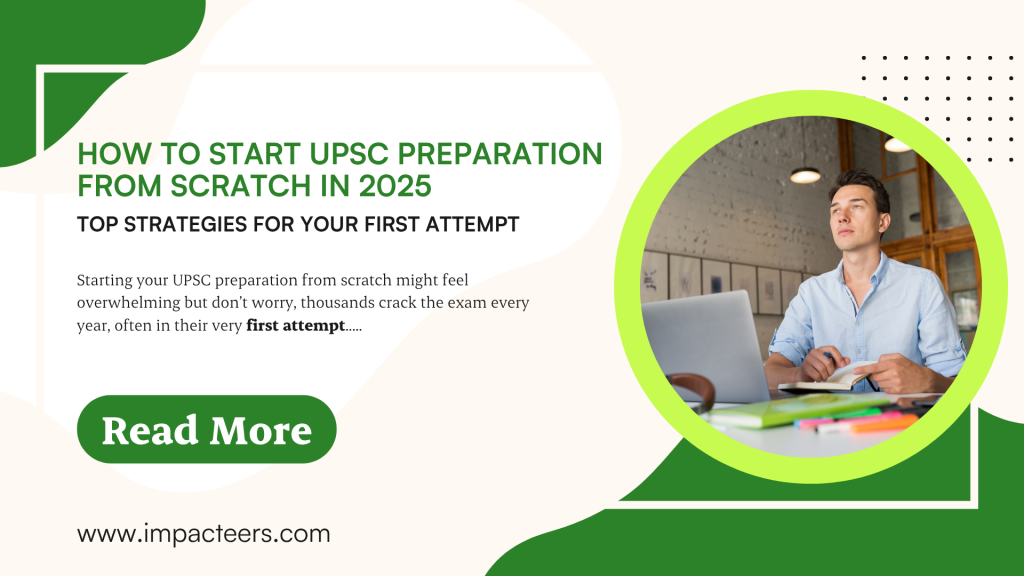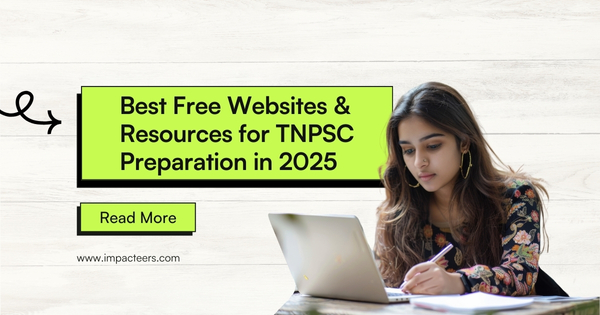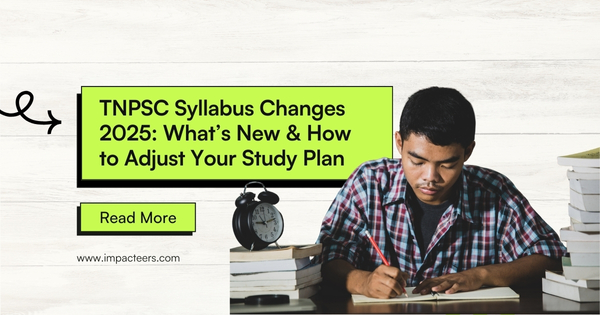A well-structured UPSC preparation timetable is the key to staying consistent, covering the vast syllabus, and maximizing your chances of success. Discover the exact daily routine followed by top UPSC aspirants—from syllabus planning, prelims practice, mains answer writing to result-oriented revision. Learn how Impacteers career events help keep you motivated and aligned.

Cracking the UPSC preparation timetable isn’t just about intelligence or bookish knowledge. It’s about discipline, consistency, and structure. The best aspirants don’t rely on luck or “last month” prep—they follow a well-planned daily schedule that aligns with the UPSC syllabus, exam cycle, question types, and revision timelines.
But here’s the truth: There’s no one-size-fits-all plan.
Instead, successful aspirants design their daily routine based on personal strengths, energy levels, study goals, and mock test feedback. This blog offers a realistic, actionable look into what an ideal UPSC aspirant’s day looks like—right from form filling dates to final answer writing for mains. And along the way, you’ll discover how Impacteers’ career events keep aspirants connected, inspired, and prepared throughout the journey.
Visit Us >>>> https://www.impacteers.com/home
1. Why a Daily Schedule is Crucial for UPSC Success
Let’s face it—UPSC prep can span 12–18 months. That’s a long haul. Without a fixed routine:
- The vast syllabus feels overwhelming.
- Important areas like CSAT or ethics paper are ignored.
- You fall into the trap of passive reading without retention.
- Time-sensitive targets like mock tests or form deadlines get missed.
A structured schedule creates predictability, which breeds discipline, which breeds results.
2. Core Principles of an Effective UPSC Daily Routine
Before we lay out the actual schedule, understand these 5 principles:
A. Block Your Time
Divide your day into 3-4 study blocks. Each block should serve a distinct purpose—content absorption, revision, question practice, and writing.
B. Follow the UPSC Exam Calendar
Your schedule should align with major milestones: prelims date, mains exam month, form deadlines, result announcements.
C. Balance GS, Optional, and Current Affairs
Don’t spend the whole day on one area. Smart aspirants rotate between GS syllabus, optional subject, and daily current affairs.
D. Don’t Neglect Rest and Reflection
Sleep, meals, and breaks are part of your productivity—not distractions.
E. Get External Feedback
Use mentorship or mock programs like those from Impacteers Career Events to check if your schedule is delivering results.
3. Sample Daily Routine of a Successful UPSC Aspirant
Here’s a 16-hour framework followed by many top performers, including working aspirants:
| Time Slot | Task Description |
| 5:30 AM | Wake up, hydrate, light stretching |
| 6:00 – 8:00 AM | Morning study block – GS Topic (e.g., Polity, Geography) |
| 8:00 – 8:30 AM | Breakfast & news headlines (The Hindu / PIB) |
| 8:30 – 10:30 AM | Current Affairs Notes + GS integration |
| 10:30 – 11:00 AM | Short break – refresh, walk, or journal |
| 11:00 – 1:00 PM | Optional Subject – Core theory or previous year questions |
| 1:00 – 2:00 PM | Lunch + Power Nap (20-30 mins) |
| 2:00 – 4:00 PM | CSAT (alternate days) / Essay practice / Maps |
| 4:00 – 4:30 PM | Break with light snacks or audio podcast |
| 4:30 – 6:00 PM | Practice MCQs (Prelims full paper every weekend) |
| 6:00 – 7:00 PM | Revision of the day’s topics |
| 7:00 – 8:00 PM | Dinner + leisure (minimal screen time) |
| 8:00 – 9:30 PM | Mains Answer Writing Practice (Alternate GS/Optional) |
| 9:30 – 10:00 PM | Plan next day, relax, bedtime routine |
4. Prelims Phase vs Mains Phase – How the Schedule Evolves
Before Prelims (Jan–May)
- Focus on syllabus coverage, daily MCQs, and paper solving.
- CSAT practice at least 2–3 times a week.
- Keep current affairs notes crisp and prelims question-oriented.
Post-Prelims Result (June–Sept)
- Switch gears: Less MCQs, more answer writing.
- Daily writing practice for GS and optional subject full papers.
- Use insights from prelims to refine weak zones.
Crack the exam with confidence by sticking to a proven UPSC preparation timetable.
5. Weekly & Monthly Targets to Keep You On Track
A good daily routine works best when it fits into a weekly plan. Here’s an example:
Weekly
- Complete 3–4 syllabus topics (GS + optional).
- Attempt 2 full-length prelims papers.
- Write 5–7 mains answers.
- Attend 1 Impacteers event or mentorship session.
Monthly
- Cover 1 GS Paper fully.
- Complete 1 full test series for optional subject.
- Track changes in current affairs, schemes, international relations.
- Sync schedule with UPSC exam date updates or form-related news.

6. The Power of Mock Tests and Answer Writing Practice
A. Prelims
- Use daily 25-question quizzes + weekly full-length paper.
- Analyze answers—not just right/wrong, but why.
B. Mains
- Don’t just write blindly. Use mentor-reviewed questions.
- Practice time management (20 questions in 3 hours).
Tip: At Impacteers’ career events, aspirants participate in mock simulations, peer reviews, and real-time writing challenges that mirror UPSC pressure.
7. How to Stay Consistent and Motivated Daily
Even the best aspirants burn out. That’s normal. What matters is how you bounce back. Here’s how top UPSC candidates maintain motivation:
- Join online study groups or telegram channels.
- Track your own growth with Excel logs or study journals.
- Attend monthly webinars or career events, especially from trusted sources like Impacteers.
- Avoid social comparison. Your journey is unique.
8. Common Pitfalls in Daily Schedules (And How to Avoid Them)
| Mistake | Correction Tip |
| Only reading, no writing | Add 30 mins daily for answer practice |
| Ignoring optional subject | Rotate between GS and optional in afternoon sessions |
| Skipping CSAT or Ethics | Schedule weekly CSAT hours + Ethics case study Sundays |
| No breaks → Burnout | Insert 10–15 min recharge sessions every 2–3 hours |
| Not syncing with exam dates | Use UPSC calendar; subscribe to updates/reminders |
9. How Impacteers Career Events Enhance Your Prep Routine
Sometimes the best way to stay on track isn’t alone—it’s by learning with the community. Impacteers’ Career Events are designed for just that.
Here’s what they offer:
- Live mentorship sessions with ex-UPSC officers.
- Themed events: Essay Bootcamps, Ethics Debates, Prelims Drill Weeks.
- Structured feedback on mock test papers, real answer scripts, and writing format.
- Exposure to model daily routines, personalized for working professionals or full-timers.
- Sessions timed around UPSC form deadlines, prelims results, and mains season.
If you ever feel stuck, these events act as a reset button to your momentum.
10. Final Tips to Build Your Personalized UPSC Day Plan
- Audit Your Energy: If you’re alert in mornings, use it for concept-heavy subjects.
- Batch Your Tasks: Group similar study areas to stay in flow.
- Use Technology Wisely: Pomodoro timers, flashcard apps, schedule trackers.
- Adapt: Life changes, so should your schedule. What matters is sticking to the core routine.
Conclusion
Your UPSC result isn’t just shaped by what books you read—it’s shaped by what you do every single day. A powerful, practical, and personalized schedule is your greatest weapon. It ensures that:
- Every topic in the syllabus is covered.
- Every form is filled on time.
- Every question gets practiced.
- Every answer improves over time.
And when life interrupts—as it often does—you always have a plan to return to. Designing a realistic UPSC preparation timetable helps you balance study, revision, and practice effectively.
Take charge of your day, set targets, and get mentorship when you need it. Impacteers career events don’t just teach—they connect you to a community of UPSC aspirants who are walking the same path. Because behind every successful result is a well-built routine—and a tribe that helped you get there.
About Us >>> https://blog.impacteers.com/
Frequently Asked Questions (FAQs)
1. What’s the ideal number of study hours for UPSC prep?
Most successful aspirants study 8–10 hours daily. But quality beats quantity. Even 6 focused hours with a strong plan are more effective than distracted 12.
2. How should I divide time between prelims and mains in my daily schedule?
In the prelims phase, focus 70% on MCQs and GS content. After the prelims result, switch to 60% answer writing and optional prep for mains.
3. Do I need to follow the same routine every single day?
No. Flexibility matters. Create a base template and modify it slightly based on weekly goals, mock schedules, or fatigue.
4. How can I avoid distractions while following a UPSC preparation timetable?
Use app blockers, remove excessive digital clutter, and study in a clean, quiet environment. Join study challenges like those in Impacteers career events for extra accountability.
5. What should I do when I feel burnt out despite following my daily schedule?
Take a full day off, attend a motivational session, or engage with UPSC aspirant communities. Impacteers’ regular motivational webinars often help reset mental energy.


Post Comment